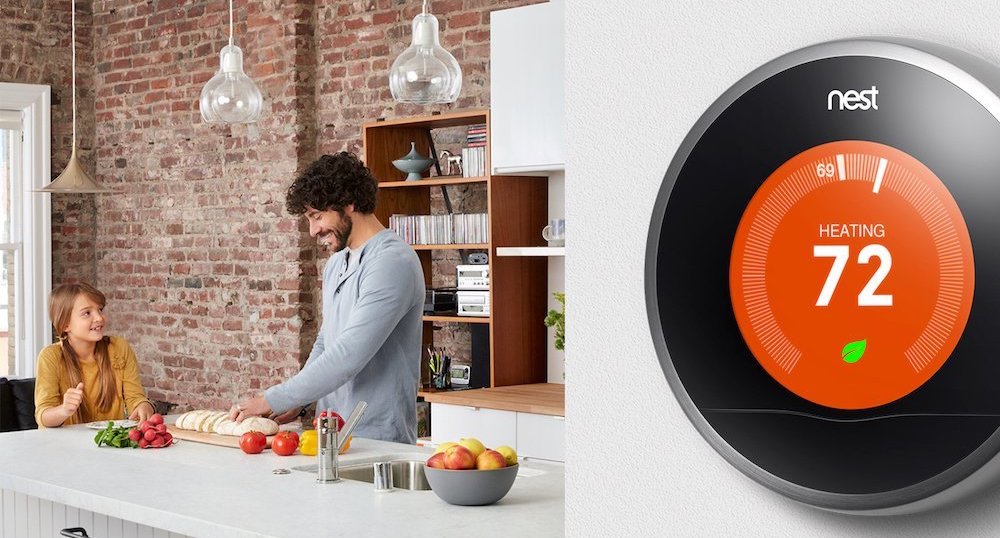Your Nest Learning Thermostat is about to not matter
Google’s roadmap for the smart home doesn’t include its most popular smart thermostat

At last week’s Google Home Developers Conference, Michele Turner, the Senior Director of Product Management, talked about how Google would support Matter, a new standard that could unify every future smart home device, no matter who makes it.
During her presentation, she highlighted all of the Google Nest devices that would support Matter, whether through built-in Thread radios or via Wi-Fi. Among the devices on the slide were the Google Nest Hub Max, Google Nest Hub (2nd gen), Nest Wifi, and the new Nest Thermostat.
Not shown: The Nest Learning Thermostat.
- The best smart thermostats for your home
- Black Friday deals: The best early sales now
- Just In: Samsung Galaxy S22 could look way different than the S22 Ultra
Yes, the iconic device that launched Nest itself 10 years ago — and remains one of the best smart thermostats, despite the hardware not changing in the last six years — will not support the next generation of smart home interoperability, Google confirmed later.
For those unfamiliar, Matter is a new smart home protocol being backed by Amazon, Google, Apple, and Samsung among others, which promises to make it a lot easier for smart home devices to connect to one another. More importantly, it should simplify the installation of smart home devices and get them communicating, regardless of whether they’re using Siri, Alexa, or Google Assistant.
Currently, there are a number of competing standards, including Zigbee, Z-Wave, Bluetooth, and even to some extent, Amazon Sidewalk. In order to get a Zigbee device to talk to, say, a Z-Wave device, or to connect either to the cloud, you’d need a smart home hub.
Even then, there are other compatibility issues — for example, none of Nest’s products work natively with HomeKit, and Ring’s cameras don’t fully work with Google Home. While some of these issues are a result of competing companies not wanting to work with each other, some of it is also due to networking issues.
Get instant access to breaking news, the hottest reviews, great deals and helpful tips.
During its Developer’s Conference, Google said that it would be releasing new tools next year to enable third-party developers to work with Google Home and other Matter devices. This is good — Google lags far behind both Amazon and even HomeKit in what you can do with those devices once connected.
Let’s use the “Leaving Home” routine as an example. In Google Home, if you want to trigger this routine, you either have to set a specific time, say a command to Google Assistant, or dismiss an alarm. In HomeKit, you can trigger this event by the location of your phone, or if a smart home device is activated — such as locking your front door or turning off the lights. You can also trigger an automation if a sensor detects something. For example, if my Ecobee smart thermostat senses motion, I can have HomeKit automatically turn the lights on in that room, and even specify when that action should occur.
It’s much the same way with Alexa. I can create routines that not only don’t need me to actively trigger them, but can run themselves based on inputs from other devices in my house. Amazon can even create routines that use the sound of babies crying, dogs barking, coughing and snoring as triggers.
The next step for all smart home technology is what Dave Limp, Amazon’s head of hardware, calls “ambient intelligence,” where your smart home devices can analyze your patterns and then suggest actions based on what it thinks you might do.
It’s less than perfect; just this morning, after I asked Alexa what the weather was like, she then helpfully mentioned that my commute was going to be a bit slower today. Unless there’s a traffic jam on the stairs to my attic office, I don’t see myself getting to work any later than usual.
“Context-driven intelligence and automation is the multiplier, and core to Google’s unique strengths,” said Turner during the keynote at the Google Home Developers Summit. “Making homes more proactively helpful is the north star of our vision for the smart home.”
So, Matter promises a new future of smart home connectivity, but if you own the original Nest Learning Thermostat, you’ll have to upgrade it if you want to take advantage. It’s a bit of a bummer — while we, as consumers, are trained to upgrade our smartphones, laptops, and TVs every few years (you don’t have to do this, either), devices such as appliances and thermostats have a much longer replacement cycle. Chances are, if you install a thermostat, it’s going to stay there for a good 20 years, if not longer. I’d be willing to bet that even if you have a first-generation Nest Learning Thermostat, which is a decade old at this point, it’s probably still going strong.
My mom has a KitchenAid stand mixer that she got as a wedding present 51 years ago; not only is it still going strong, but it has arguably gained more abilities as KitchenAid has released new attachments over the years.
It’s a testament to Nest that they have designed a product so well, but the problem with electronics is the planned obsolescence. At some point, companies stop supporting them and issuing updates to keep them functioning.
While Google hasn’t said anything officially, I would expect it to reveal an updated Nest Learning Thermostat some time next year that supports Matter; I bet a new Nest Protect smart smoke detector is on the horizon, too. I’m also reasonably confident that current Nest devices will continue to function well into the future. It’s just a shame that they won’t matter.

Michael A. Prospero is the U.S. Editor-in-Chief for Tom’s Guide. He oversees all evergreen content and oversees the Homes, Smart Home, and Fitness/Wearables categories for the site. In his spare time, he also tests out the latest drones, electric scooters, and smart home gadgets, such as video doorbells. Before his tenure at Tom's Guide, he was the Reviews Editor for Laptop Magazine, a reporter at Fast Company, the Times of Trenton, and, many eons back, an intern at George magazine. He received his undergraduate degree from Boston College, where he worked on the campus newspaper The Heights, and then attended the Columbia University school of Journalism. When he’s not testing out the latest running watch, electric scooter, or skiing or training for a marathon, he’s probably using the latest sous vide machine, smoker, or pizza oven, to the delight — or chagrin — of his family.
